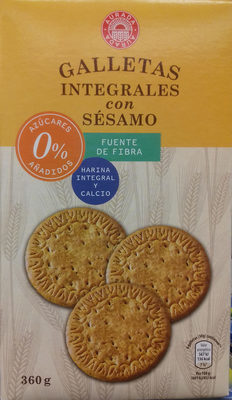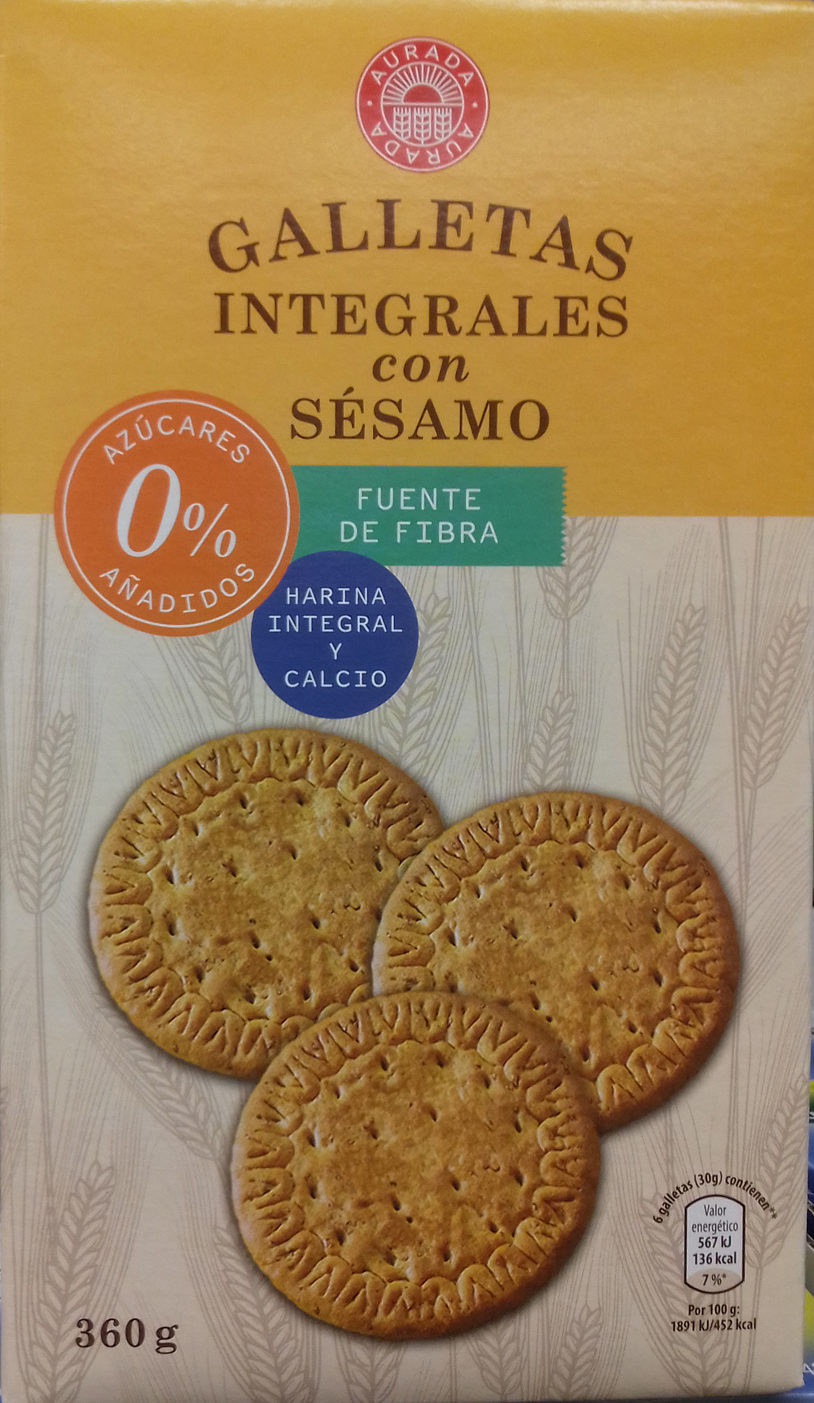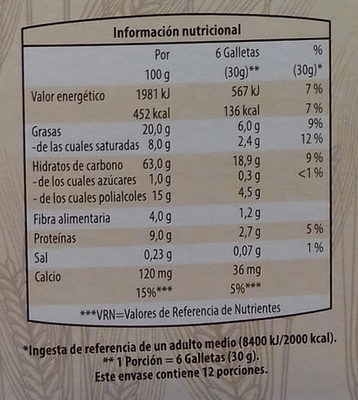Help us make food transparency the norm!
As a non-profit organization, we depend on your donations to continue informing consumers around the world about what they eat.
The food revolution starts with you!
Galletas integrales con sésamo - Aurada - 360 g
Galletas integrales con sésamo - Aurada - 360 g
Ambiguous barcode: This product has a Restricted Circulation Number barcode for products within a company. This means that different producers and stores can use the same barcode for different products.
×
This product page is not complete. You can help to complete it by editing it and adding more data from the photos we have, or by taking more photos using the app for Android or iPhone/iPad. Thank you!
×
Barcode: 24044035
Common name: Galletas con semillas de sésamo con edulcorantes
Quantity: 360 g
Packaging: Plastic, Box, Container
Brands: Aurada
Categories: Snacks, Sweet snacks, Biscuits and cakes, Biscuits, es:Galletas maría
Labels, certifications, awards: Low or no sugar, Source of fibre, High fibres, No added sugar, es:Harina integral y calcio
Manufacturing or processing places: España
Link to the product page on the official site of the producer: https://supermercados.aldi.es/detalle-pr...
Stores: Aldi
Countries where sold: Spain
Matching with your preferences
Health
Ingredients
-
20 ingredients
: Harina integral de trigo (29%), Harina de trigo, grasa vegetal (palma y girasol), edulcorantes (maltitoles, acesulfamo K), semillas de sésamo (2,5%), harina de malta de cebada, almidón de patata, gasificantes (carbonatos de sodio, carbonatos de amonio), carbonato de calcio, aroma, emulgente (lecitina), conservador (metabisulfito potásico).Allergens: Gluten, Sesame seeds, es:metabisulfito-potasico, es:metabisulfito-potasicoTraces: Eggs, Fish, Nuts, Soybeans
Food processing
-
Ultra processed foods
Elements that indicate the product is in the 4 - Ultra processed food and drink products group:
- Additive: E322 - Lecithins
- Additive: E950 - Acesulfame k
- Additive: E965 - Maltitol
- Ingredient: Emulsifier
- Ingredient: Flavouring
- Ingredient: Sweetener
Food products are classified into 4 groups according to their degree of processing:
- Unprocessed or minimally processed foods
- Processed culinary ingredients
- Processed foods
- Ultra processed foods
The determination of the group is based on the category of the product and on the ingredients it contains.
Additives
-
E224 - Potassium metabisulphite
Potassium metabisulfite: Potassium metabisulfite, K2S2O5, also known as potassium pyrosulfite, is a white crystalline powder with a pungent sulfur odour. The main use for the chemical is as an antioxidant or chemical sterilant. It is a disulfite and is chemically very similar to sodium metabisulfite, with which it is sometimes used interchangeably. Potassium metabisulfite is generally preferred out of the two as it does not contribute sodium to the diet. Potassium metabisulfite has a monoclinic crystal structure which decomposes at 190 °C, yielding potassium sulfite and sulfur dioxide: K2S2O5-s- → K2SO3-s- + SO2-g-Source: Wikipedia
-
E322 - Lecithins
Lecithins are natural compounds commonly used in the food industry as emulsifiers and stabilizers.
Extracted from sources like soybeans and eggs, lecithins consist of phospholipids that enhance the mixing of oil and water, ensuring smooth textures in various products like chocolates, dressings, and baked goods.
They do not present any known health risks.
-
E322i - Lecithin
Lecithins are natural compounds commonly used in the food industry as emulsifiers and stabilizers.
Extracted from sources like soybeans and eggs, lecithins consist of phospholipids that enhance the mixing of oil and water, ensuring smooth textures in various products like chocolates, dressings, and baked goods.
They do not present any known health risks.
-
E500 - Sodium carbonates
Sodium carbonates (E500) are compounds commonly used in food preparation as leavening agents, helping baked goods rise by releasing carbon dioxide when they interact with acids.
Often found in baking soda, they regulate the pH of food, preventing it from becoming too acidic or too alkaline. In the culinary world, sodium carbonates can also enhance the texture and structure of foods, such as noodles, by modifying the gluten network.
Generally recognized as safe, sodium carbonates are non-toxic when consumed in typical amounts found in food.
-
E503 - Ammonium carbonates
Ammonium carbonate: Ammonium carbonate is a salt with the chemical formula -NH4-2CO3. Since it readily degrades to gaseous ammonia and carbon dioxide upon heating, it is used as a leavening agent and also as smelling salt. It is also known as baker's ammonia and was a predecessor to the more modern leavening agents baking soda and baking powder. It is a component of what was formerly known as sal volatile and salt of hartshorn.Source: Wikipedia
-
E950 - Acesulfame k
Acesulfame potassium: Acesulfame potassium - AY-see-SUL-faym-, also known as acesulfame K -K is the symbol for potassium- or Ace K, is a calorie-free sugar substitute -artificial sweetener- often marketed under the trade names Sunett and Sweet One. In the European Union, it is known under the E number -additive code- E950. It was discovered accidentally in 1967 by German chemist Karl Clauss at Hoechst AG -now Nutrinova-. In chemical structure, acesulfame potassium is the potassium salt of 6-methyl-1‚2,3-oxathiazine-4-3H--one 2‚2-dioxide. It is a white crystalline powder with molecular formula C4H4KNO4S and a molecular weight of 201.24 g/mol.Source: Wikipedia
-
E965 - Maltitol
Maltitol: Maltitol is a sugar alcohol -a polyol- used as a sugar substitute. It has 75–90% of the sweetness of sucrose -table sugar- and nearly identical properties, except for browning. It is used to replace table sugar because it is half as caloric, does not promote tooth decay, and has a somewhat lesser effect on blood glucose. In chemical terms, maltitol is known as 4-O-α-glucopyranosyl-D-sorbitol. It is used in commercial products under trade names such as Lesys, Maltisweet and SweetPearl.Source: Wikipedia
Ingredients analysis
-
Palm oil
Ingredients that contain palm oil: Palm
-
Maybe vegan
Ingredients that may not be vegan: E170i, Flavouring, E322i
-
Maybe vegetarian
Ingredients that may not be vegetarian: E170i, Flavouring, E322i
-
Details of the analysis of the ingredients
: Harina integral de _trigo_ 29%, Harina de _trigo_, grasa vegetal (palma, girasol), edulcorantes (maltitoles, acesulfamo K), semillas de _sésamo_ 2.5%, harina de malta de _cebada_, almidón de patata, gasificantes (carbonatos de sodio, carbonatos de amonio), carbonato de calcio, aroma, emulgente (lecitina), conservador (_metabisulfito potásico_)- Harina integral de _trigo_ -> en:whole-wheat-flour - vegan: yes - vegetarian: yes - ciqual_proxy_food_code: 9410 - percent_min: 29 - percent: 29 - percent_max: 29
- Harina de _trigo_ -> en:wheat-flour - vegan: yes - vegetarian: yes - ciqual_proxy_food_code: 9410 - percent_min: 6.45454545454545 - percent_max: 29
- grasa vegetal -> en:vegetable-fat - vegan: yes - vegetarian: yes - from_palm_oil: maybe - percent_min: 4.2 - percent_max: 29
- palma -> en:palm - vegan: yes - vegetarian: yes - from_palm_oil: yes - ciqual_food_code: 16129 - percent_min: 2.1 - percent_max: 29
- girasol -> en:sunflower - vegan: yes - vegetarian: yes - percent_min: 0 - percent_max: 14.5
- edulcorantes -> en:sweetener - percent_min: 2.5 - percent_max: 24.375
- maltitoles -> en:e965 - vegan: yes - vegetarian: yes - percent_min: 1.25 - percent_max: 24.375
- acesulfamo K -> en:e950 - vegan: yes - vegetarian: yes - percent_min: 0 - percent_max: 12.1875
- semillas de _sésamo_ -> en:sesame-seeds - vegan: yes - vegetarian: yes - ciqual_food_code: 15010 - percent_min: 2.5 - percent: 2.5 - percent_max: 2.5
- harina de malta de _cebada_ -> en:barley-malt-flour - vegan: yes - vegetarian: yes - ciqual_food_code: 9550 - percent_min: 0 - percent_max: 2.5
- almidón de patata -> en:potato-starch - vegan: yes - vegetarian: yes - ciqual_proxy_food_code: 9510 - percent_min: 0 - percent_max: 2.5
- gasificantes -> en:raising-agent - percent_min: 0 - percent_max: 2.5
- carbonatos de sodio -> en:e500 - vegan: yes - vegetarian: yes - percent_min: 0 - percent_max: 2.5
- carbonatos de amonio -> en:e503 - vegan: yes - vegetarian: yes - percent_min: 0 - percent_max: 1.25
- carbonato de calcio -> en:e170i - vegan: maybe - vegetarian: maybe - percent_min: 0 - percent_max: 2.5
- aroma -> en:flavouring - vegan: maybe - vegetarian: maybe - percent_min: 0 - percent_max: 2.5
- emulgente -> en:emulsifier - percent_min: 0 - percent_max: 2.5
- lecitina -> en:e322i - vegan: maybe - vegetarian: maybe - percent_min: 0 - percent_max: 2.5
- conservador -> en:preservative - percent_min: 0 - percent_max: 2.5
- _metabisulfito potásico_ -> en:e224 - vegan: yes - vegetarian: yes - percent_min: 0 - percent_max: 2.5
Nutrition
-
Average nutritional quality
⚠ ️Warning: the amount of fruits, vegetables and nuts is not specified on the label, it was estimated from the list of ingredients: 0This product is not considered a beverage for the calculation of the Nutri-Score.
Positive points: 4
- Proteins: 5 / 5 (value: 9, rounded value: 9)
- Fiber: 4 / 5 (value: 4, rounded value: 4)
- Fruits, vegetables, nuts, and colza/walnut/olive oils: 0 / 5 (value: 0, rounded value: 0)
Negative points: 13
- Energy: 5 / 10 (value: 1981, rounded value: 1981)
- Sugars: 0 / 10 (value: 1, rounded value: 1)
- Saturated fat: 7 / 10 (value: 8, rounded value: 8)
- Sodium: 1 / 10 (value: 92, rounded value: 92)
The points for proteins are not counted because the negative points are greater or equal to 11.
Nutritional score: (13 - 4)
Nutri-Score:
-
Nutrient levels
-
Fat in moderate quantity (20%)
What you need to know- A high consumption of fat, especially saturated fats, can raise cholesterol, which increases the risk of heart diseases.
Recommendation: Limit the consumption of fat and saturated fat- Choose products with lower fat and saturated fat content.
-
Saturated fat in high quantity (8%)
What you need to know- A high consumption of fat, especially saturated fats, can raise cholesterol, which increases the risk of heart diseases.
Recommendation: Limit the consumption of fat and saturated fat- Choose products with lower fat and saturated fat content.
-
Sugars in low quantity (1%)
What you need to know- A high consumption of sugar can cause weight gain and tooth decay. It also augments the risk of type 2 diabetes and cardio-vascular diseases.
Recommendation: Limit the consumption of sugar and sugary drinks- Sugary drinks (such as sodas, fruit beverages, and fruit juices and nectars) should be limited as much as possible (no more than 1 glass a day).
- Choose products with lower sugar content and reduce the consumption of products with added sugars.
-
Salt in low quantity (0.23%)
What you need to know- A high consumption of salt (or sodium) can cause raised blood pressure, which can increase the risk of heart disease and stroke.
- Many people who have high blood pressure do not know it, as there are often no symptoms.
- Most people consume too much salt (on average 9 to 12 grams per day), around twice the recommended maximum level of intake.
Recommendation: Limit the consumption of salt and salted food- Reduce the quantity of salt used when cooking, and don't salt again at the table.
- Limit the consumption of salty snacks and choose products with lower salt content.
-
-
Nutrition facts
Nutrition facts As sold
for 100 g / 100 mlAs sold
per serving (6 galletas 30 g)Compared to: es:Galletas maría Energy 1,981 kj
(473 kcal)594 kj
(142 kcal)+7% Fat 20 g 6 g +63% Saturated fat 8 g 2.4 g +186% Carbohydrates 63 g 18.9 g -14% Sugars 1 g 0.3 g -95% Polyols (sugar alcohols) 15 g 4.5 g Fiber 4 g 1.2 g +19% Proteins 9 g 2.7 g +28% Salt 0.23 g 0.069 g -70% Calcium 120 mg 36 mg Fruits‚ vegetables‚ nuts and rapeseed‚ walnut and olive oils (estimate from ingredients list analysis) 0 % 0 %
Environment
-
Eco-Score C - Moderate environmental impact
⚠ ️Select a country in order to include the full impact of transportation.The Eco-Score is an experimental score that summarizes the environmental impacts of food products.→ The Eco-Score was initially developped for France and it is being extended to other European countries. The Eco-Score formula is subject to change as it is regularly improved to make it more precise and better suited to each country.Life cycle analysis
-
Average impact of products of the same category: B (Score: 69/100)
Category: Biscuit (cookie)
Category: Biscuit (cookie)
- PEF environmental score: 0.35 (the lower the score, the lower the impact)
- including impact on climate change: 2.88 kg CO2 eq/kg of product
Stage Impact Agriculture
80.5 %Processing
11.8 %Packaging
3.1 %Transportation
3.2 %Distribution
1.4 %Consumption
0.0 %
Bonuses and maluses
-
Missing origins of ingredients information
Malus: -5
⚠ ️ The origins of the ingredients of this product are not indicated.
If they are indicated on the packaging, you can modify the product sheet and add them.
If you are the manufacturer of this product, you can send us the information with our free platform for producers.
-
Ingredients that threatens species
Malus: -10
Contains palm oil
Tropical forests in Asia, Africa and Latin America are destroyed to create and expand oil palm tree plantations. The deforestation contributes to climate change, and it endangers species such as the orangutan, the pigmy elephant and the Sumatran rhino.
-
Packaging with a medium impact
Malus: -10
Shape Material Recycling Impact Box Plastic High
Eco-Score for this product
-
Impact for this product: C (Score: 44/100)
Product: Galletas integrales con sésamo - Aurada - 360 g
Life cycle analysis score: 69
Sum of bonuses and maluses: -25
Final score: 44/100
-
Carbon footprint
-
Equal to driving 1.5 km in a petrol car
288 g CO² per 100g of product
The carbon emission figure comes from ADEME's Agribalyse database, for the category: Biscuit (cookie) (Source: ADEME Agribalyse Database)
Stage Impact Agriculture
82.9 %Processing
7.9 %Packaging
3.8 %Transportation
4.7 %Distribution
0.7 %Consumption
0.0 %
Packaging
-
Packaging with a medium impact
-
Packaging parts
Box (Plastic)
-
Packaging materials
Material % Packaging weight Packaging weight per 100 g of product Plastic
-
Transportation
-
Origins of ingredients
Missing origins of ingredients information
⚠ ️ The origins of the ingredients of this product are not indicated.
If they are indicated on the packaging, you can modify the product sheet and add them.
If you are the manufacturer of this product, you can send us the information with our free platform for producers.Add the origins of ingredients for this product Add the origins of ingredients for this product
Threatened species
-
Contains palm oil
Drives deforestation and threatens species such as the orangutan
Tropical forests in Asia, Africa and Latin America are destroyed to create and expand oil palm tree plantations. The deforestation contributes to climate change, and it endangers species such as the orangutan, the pigmy elephant and the Sumatran rhino.
Report a problem
-
Incomplete or incorrect information?
Category, labels, ingredients, allergens, nutritional information, photos etc.
If the information does not match the information on the packaging, please complete or correct it. Open Food Facts is a collaborative database, and every contribution is useful for all.
Data sources
Product added on by neptuno
Last edit of product page on by packbot.
Product page also edited by tacite, thaialagata.











